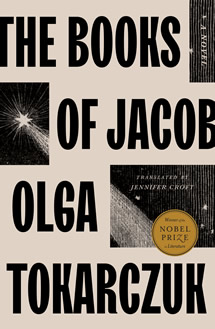Reviewed by Robert Goodman.
By Olga Tokarczuk, Text, $34.99.
 Nobel Prize winner Olga Tokarczuk’s 2014 magnum opus has now been translated into English by Jennifer Croft. The Books of Jacob, a close to one thousand page deep dive of a little known Jewish Messianic sect that emerged in the Ukraine in the eighteenth century. But it is of course, much more than that. Over its course The Books of Jacob considers issues of faith, mysticism, religion, science, family, politics, sex and the changing state of the world over the course of an eventful eighty years (and beyond).
Nobel Prize winner Olga Tokarczuk’s 2014 magnum opus has now been translated into English by Jennifer Croft. The Books of Jacob, a close to one thousand page deep dive of a little known Jewish Messianic sect that emerged in the Ukraine in the eighteenth century. But it is of course, much more than that. Over its course The Books of Jacob considers issues of faith, mysticism, religion, science, family, politics, sex and the changing state of the world over the course of an eventful eighty years (and beyond).
The book charts the life and exploits of Jacob Frank, a minor messianic figure, and his followers but it takes over one hundred pages before he is mentioned. This is because Tokarczuk is much more interested in those in and around this central figure than the man himself. The majority of the book is told or seen from perspectives other than those of Frank such that while many of the characters gain depth, his inner life remains something of a mystery. Jacob Frank, and the messianic figures who came before him, emerged from a history of violent anti-semitism, including the use of the blood libel to excuse the destruction of Jewish communities across Eastern Europe. Frank promised something better but he did so by preaching to his followers that they forgo the fundamentals of their Jewish heritage, deliberately go against the rules they lived by, and carve out a new existence. At one point this involved converting to Islam and later, much more publicly, to Christianity. On the sides of this story are priests and nobles who either opposed or supported Frank and his followers (known as ‘contra-Talmudists’) particularly when they could be brought into the Church and used to sew dissent in the Jewish community.
Even from the outside, Frank comes across in this narrative as a classic cult leader. He created his own rules, he broke down sexual mores and encouraged his followers to do the same, binding them to his closer, and he promised spiritual and material rewards that his followers continued to believe he could deliver even as they clearly did not manifest. But while he was clearly an opportunist and in some ways a charlatan, Frank also provides inspiration and hope for a group of people who had for many years been oppressed. Interestingly, through one of the characters Tokarczuk touches on Baal Shem Tov and the rise of the Hassidic movement which found its expression deeper within the mystic side of Judaism rather than moving away from it. The Frank movement, on the other hand, was solely focussed on his obviously charismatic presence so that as he aged and his faculties started to wane, so did the movement. That said, at the same time, Europe was entering the “Age of Enlightenment” so that religion itself had a weaker hold on the next generations.
The Books of Jacob is a mammoth effort of historical research presented as a novel. Peopled with a myriad of fascinating characters (many of whom change name when they convert, increasing the challenge), rich in detail and covering almost a century of European history. At almost one thousand pages and with a wide historical scope, while the story of the Frank movement seems to be a relatively local and minor one, The Books of Jacob cannot be called anything other than an epic.











